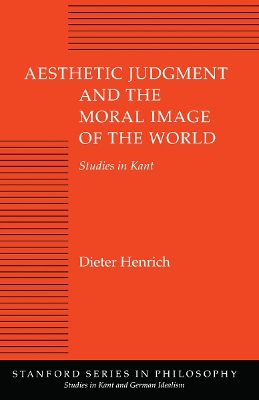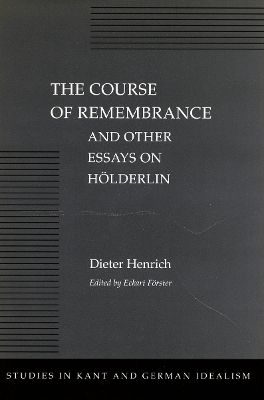Studies in Kant and German Idealism
2 total works
This is a collection of four essays on aesthetic, ethical, and political issues by Dieter Henrich, the preeminent Kant scholar in Germany today. Although his interests have ranged widely, he is perhaps best known for rekindling interest in the great classical German tradition from Kant to Hegel.
The first essay summarizes Henrich's research into the development of the Kant's moral philosophy, focusing on the architecture of the third Critique. Of special interest in this essay is Henrich's intriguing and wholly new account of the relations between Kant and Rousseau. In the second essay, Henrich analyzes the interrelations between Kant's aesthetics and his cognitive theories. His third essay argues that the justification of the claim that human rights are universally valid requires reference to a moral image of the world. To employ Kant's notion of a moral image of the world without ignoring the insights and experience of this century requires drastic changes in the content of such an image. Finally, in Henrich's ambitious concluding essay, the author compares the development of the political process of the French Revolution and the course of classical German philosophy, raise the general question of the relation between political processes and theorizing, and argues that both the project of political liberty set in motion by the French Revolution, and the projects of classical German philosophy remain incomplete.
Friedrich Hölderlin (1770-1843) has long been recognized as one of the greatest poets of the German language, but his importance to philosophy has surfaced only comparatively recently. Although Schelling and Hegel acknowledged Hölderlin early on as their equal, for a long time his philosophical thought remained unknown outside the small circle of his friends.
Among the most prominent figures in the rediscovery of Hölderlin's thought is Dieter Henrich, who, in a series of highly influential studies over the last thirty years, has shown that Hölderlin played a decisive role in the development of philosophy from Kant to Hegel, and hence in the formation of German Idealism. Among other things, Henrich demonstrated that Hölderlin, while still a student, launched a powerful critique of Fichte's Wissenschaftslehre and outlined an alternative to the dominant view of the foundation of philosophy. This alternative proved pathbreaking for his philosophical friends, forcing Hegel, for example, to abandon his own Kantianism and, eventually, to give systematic articulation to a position that went even beyond Hölderlin's.
This volume includes six of Henrich's most important essays on Hölderlin's philosophical significance. Among the topics discussed are Hölderlin's motivation and methodological orientation in his work on German Idealism, the intellectual atmosphere of Hölderlin's student years and the philosophical problems that occupied him, Hölderlin's attitude toward any first-principle philosophy, and the complex personal and philosophical relationships between Hegel and Hölderlin. The last essay is a long, detailed interpretation of one of Hölderlin's greatest poems, "Remembrance." In elucidating its lyric composition and structure, Henrich also seeks to show how it incorporates and develops Hölderlin's philosophical thought.

